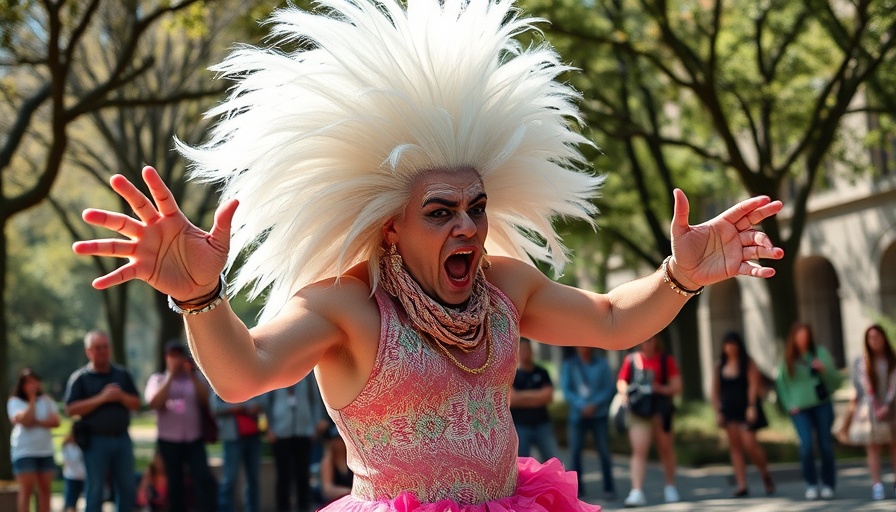
A Colorful Response: UT’s Day of Drag
On an ordinary day at the University of Texas at Austin, students dart across campus, their minds preoccupied with lectures and deadlines. Yet, on a recent Monday, something extraordinary happened. Instead of rushing to class, a vibrant group of students stopped at a makeshift makeup station, transforming themselves into living canvases of self-expression. This was the 'Day of Drag,' an initiative born from a necessity to protest the university’s recent ban on drag performances and a vibrant reflection of the culture of defiance within the LGBTQ+ community.
A Ban That Provoked a Movement
In March, the UT System Board of Regents imposed a ban on hosting or sponsoring drag shows across its universities, aligning with restrictive measures across Texas campuses. This crackdown reflects a broader trend that suggests a hostile shift against LGBTQ+ rights within the state, particularly for institutions of higher learning. Last month, Texas A&M had already put similar measures in place, claiming such performances could foster a hostile environment for women. As students at UT learned about the ban through formal declarations and vague statements, the lack of clarity ignited their determination to act, leading Isabella Thomas, among others, to launch this eye-catching protest.
Shared Strategies and Collective Resistance
Students saw that their peers elsewhere—like Texas A&M—had successfully rallied in response to their ban, leading to temporary federal injunctions protecting their rights to perform. In this spirit of solidarity, activists from the Queer Empowerment Council and various organizations collaborated, learning that collective action gives voice to the marginalized. For Thomas, organizing the Day of Drag was not just about performance; it was about solidarity and visibility in the face of oppression.
The Impact of Drag Culture on Campus
The Day of Drag was infused with a sense of community. Participants observed how drag transcends mere entertainment; it becomes a powerful medium for political expression. The atmosphere buzzed with acceptance as diverse students fully embraced their identities in a colorful and celebratory fashion. For many involved, it was a cathartic experience—shedding daily pressures while basking in mutual support.
Reflections on Freedom of Expression
The legacy of drag performances serves as a reminder of free expression’s importance in democratic societies. By asserting their right to express themselves, the students not only counter the university's ban but also challenge the underlying societal perceptions that fuel such regulations. As Judge Lee Rosenthal noted in the A&M case, the remedy for those offended is simple: choice. The decision to participate in drag is an exercise of personal liberties indicative of deeper societal values.
Unforeseen Allies: The Role of Legal Support
The collaboration with organizations like the Foundation for Individual Rights and Expression signifies just how crucial legal protection is for artistic expression in academic spaces. Their support amplifies student voices, offering legal recourse against oppressive policies that seek to stifle representation. With ongoing battles in courts, the movement not only holds the universities accountable but also fosters conversations about inclusion that extend beyond campus.
The Road Ahead: More Than a Day of Drag
As the Day of Drag concluded, participants were left not only with memories of colorful outfits and playful makeup but with a renewed sense of purpose. Awareness of LGBTQ+ rights, now spotlighted through such vibrant activism, could lead to a larger movement pushing against retrogressive policies in educational institutions across the state. It’s clear that while this event may have started as a protest, it has fueled discussions about identity, rights, and acceptance that echo far beyond the university.
What’s Next for LGBTQ+ Advocacy in Texas?
This action demonstrates a larger trend where students are taking ownership of their rights and expressing themselves amid pervasive threats. Advocacy groups are likely to see a surge in participation and visibility, positioned at the forefront of civil rights movements in Texas. The future of drag, and LGBTQ+ rights overall, will depend on continued student activism, community support, and unwavering resilience.
 Add Row
Add Row  Add
Add 




Write A Comment